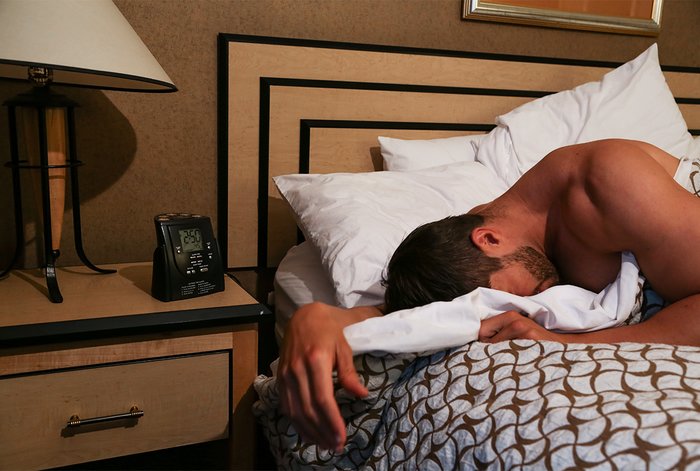The words "night shift" might conjure images of zombies behind the counter at conveniences stores, but more than 20 percent of U.S. working adults pull the night shift.[1] And the research tells us that all of these individuals face some pretty major health challenges simply because of the hours they work.
Take Jessica, for instance. Jessica was a fitness enthusiast and foodie who exercised six days a week and maintained a lean physique year round. After she graduated from nursing school, she accepted her first job working nights at a local hospital.
In just three months, she gained 12 pounds, and her exercise routine dropped to two days per week. It wasn't that Jessica suddenly started making horrible food choices or decided to give up exercise. She had become hungrier than ever, yet more tired than her days spent pulling all-nighters in college.

People who work the night shift often face health challenges because of the hours they keep.
It's obvious something more was going on as a result of this schedule flip-flop. In fact, a study out of Chronobiology International found that working the night shift was an independent contributor to weight gain and abdominal obesity.[2]
Sometimes, burning the midnight oil is inevitable, but it doesn't have to stand between you and your goal physique. Learn why weight gain is more likely to happen when working nights and what you can do to keep it at bay!
The Ripple Effect
The instigator for the numerous metabolic changes that take place as a result of working the night shift is sleep deprivation. Upsetting your body's natural circadian rhythm makes sleep difficult. Couple this with daytime distractions, and it's no wonder those who work nights average significantly less z's than those who sleep on a regular nightly schedule.[3]
According to a study of tens of thousands of people, underway since the 1960s, people who average less than 7 hours of sleep per night tend to have greater BMI values versus those averaging more than 7 hours.[4]
Less sleep per 24 hours blatantly manifests itself via short-term fatigue and irritability, but it's the slow accumulation of silent adaptations that takes a toll on your health and fitness in the long term.
Consequences Of The Nightshift
1. You Burn Fewer Calories Per Day
According to a study out of Proceedings of the National Academy of Sciences, one consequence of opposing your natural sleep-wake cycle is burning 52-59 fewer calories per day on average compared to people who maintained their normal sleeping habits.[5]
That may not seem significant, but over the course of a week, you're looking at 364-416 fewer calories burned. What you once thought to be a caloric deficit may turn out to in fact be a slight surplus.
Solution: Reduce daily calories by 5 percent to account for the decrease in daily energy expenditure.
2. You Burn Fewer Calories Per Meal
Digesting, absorbing, and distributing nutrients accounts for roughly 10 percent of your daily energy expenditure. The scientific name for this process is the "thermic effect of food."

The number of calories you burn per meal—referred to as the thermic effect of food, or tef—decreases when you eat most of your meals at night.
Research in The American Journal of Clinical Nutrition found that subjects who ate their meals during the nighttime hours had a significantly lower TEF compared to subjects consuming the same meals during daytime hours.[6]
Solution: Protein has a higher TEF than fat or carbohydrate, so up your protein 10-15 percent.
3. Your Blood Sugar Suffers
Glucose tolerance—your body's ability to secrete the appropriate levels of insulin to keep glucose levels at bay after a meal—is best in the morning. It lessens and reaches its nadir at night.[7]
If you're working nights and eating most of your calories after the sun goes down, glucose is more likely to be shuttled into fat cells or left in your blood, neither of which is beneficial for your physique goals.
Solution: Slash your carbohydrate intake by 10-15 percent, and choose high-fiber options such as oats or brown rice. The high-fiber content will assist in slowing down glucose release, enhancing glucose tolerance.
4. You Become Hungrier
A major way sleep deprivation manifests itself is through an increase in hunger. Your brain and body are fatigued, so your brain sends signals to get you to eat. The problem: Your brain sends signals often, each one stronger than the last.
The result is a decrease in the appetite-suppressing hormone leptin and an increase in the appetite-promoting hormone ghrelin. The fewer hours you sleep, the more pronounced these changes become.[8]
Solution: Eat every 3 hours to keep your appetite under control. Yes, this may result in an extra meal or two, but it will help to combat hunger and decrease the likelihood that you overindulge on a high-calorie sweet at some point.
Easy snacks such as a whey protein shake, a pouch of jerky, or canned tuna are excellent options to keep on hand!
5. You Experience Trouble Sleeping
As I eluded to earlier, sleep deprivation is the major reason many negative consequences occur. Exercising before bed, or jacking yourself up on stimulants just prior to your goal bedtime, will leave you lying in bed wide-eyed and mind racing.

Exercising before bed, or jacking yourself up on stimulants just prior to your goal bedtime, will leave you lying in bed wide-eyed and mind racing.
Solution: Wake up a few hours before your shift to get your workout completed rather than exercising after your shift. Making time shortly after waking will increase the likelihood you work out, which will work wonders for your physique. Plus, exercise enhances insulin sensitivity, which may help to mitigate some of the glucose intolerance discussed earlier.[9]
To further enhance sleep quality, stop taking stimulants six hours prior to your goal bedtime. Taking them too close to shuteye will impair deep sleep and recovery.[10] If you're still keen on late-night stimulants, consider supplementing with theacrine, a caffeine complement with a structure similar to caffeine.
When it's taken in addition to caffeine, theacrine has been shown to enhance and prolong the cognitive benefits associated with caffeine.[11] Plus, theacrine isn't habit forming, so you won't build up a tolerance to daily use.[13]
References
- McMenamin, T. M. (2007). Time to work: recent trends in shift work and flexible schedules. Monthly Labor Review, 130,3.
- Macagnan, J., Pattussi, M. P., Canuto, R., Henn, R. L., Fassa, A. G., & Olinto, M. T. A. (2012). Impact of nightshift work on overweight and abdominal obesity among workers of a poultry processing plant in southern Brazil. Chronobiology International, 29(3), 336-343.
- Johnson, L. C., Tepas, D. I., Colquhoun, W. P., & Colligan, M. J. (1980). The twenty-four hour workday: Proceedings of a Symposium on Variations in Work-Sleep Schedules. San Diego State University Foundation California.
- Gangwisch, J. E., Malaspina, D., Boden-Albala, B., & Heymsfield, S. B. (2005). Inadequate sleep as a risk factor for obesity: analyses of the NHANES I. Sleep-New York Then Westchester, 28(10), 1289.
- McHill, A. W., Melanson, E. L., Higgins, J., Connick, E., Moehlman, T. M., Stothard, E. R., & Wright, K. P. (2014). Impact of circadian misalignment on energy metabolism during simulated nightshift work. Proceedings of the National Academy of Sciences, 111(48), 17302-17307.
- Romon, M., Edme, J. L., Boulenguez, C., Lescroart, J. L., & Frimat, P. (1993). Circadian variation of diet-induced thermogenesis. The American Journal of Clinical Nutrition, 57(4), 476-480.
- Knutson, K. L. (2007). Impact of sleep and sleep loss on glucose homeostasis and appetite regulation. Sleep Medicine Clinics, 2(2), 187-197.
- Finn, L., Young, T., Palta, M., & Fryback, D. G. (1998). Sleep-disordered breathing and self-reported general health status in the Wisconsin Sleep Cohort Study. Sleep New York, 21, 701-708.
- Borghouts, L. B., & Keizer, H. A. (2000). Exercise and insulin sensitivity: a review. International Journal of Sports Medicine, 21(1), 1-12.
- Brezinová, V. (1974). Effect of caffeine on sleep: EEG study in late middle age people. British Journal of Clinical Pharmacology, 1(3), 203-208.
- Kuhman, D. J., Joyner, K. J., & Bloomer, R. J. (2015). Cognitive Performance and Mood Following Ingestion of a Theacrine-Containing Dietary Supplement, Caffeine, or Placebo by Young Men and Women. Nutrients, 7(11), 9618-9632.
- Feduccia, A. A., Wang, Y., Simms, J. A., Henry, Y. Y., Li, R., Bjeldanes, L., ... & Bartlett, S. E. (2012). Locomotor activation by theacrine, a purine alkaloid structurally similar to caffeine: involvement of adenosine and dopamine receptors. Pharmacology Biochemistry and Behavior, 102(2), 241-248.
- Taylor, L., Mumford, P., Roberts, M., Hayward, S., Mullins, J., Urbina, S., & Wilborn, C. (2016). Safety of TeaCrine®, a non-habituating, naturally-occurring purine alkaloid over eight weeks of continuous use. Journal of the International Society of Sports Nutrition, 13(1), 2.

